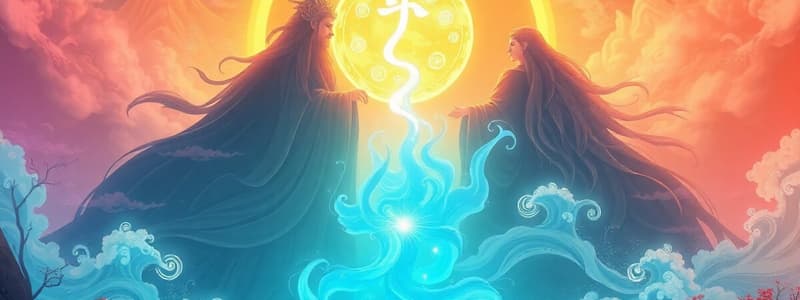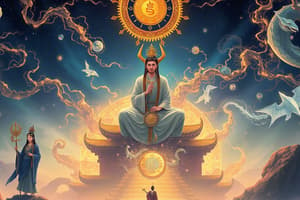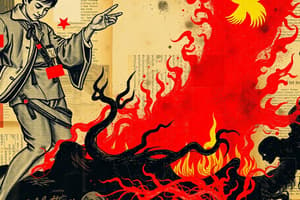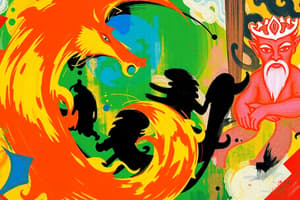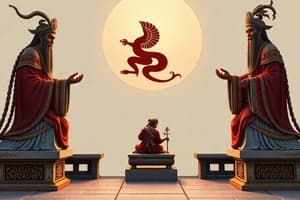Podcast
Questions and Answers
Taoists believe in the concept of spiritual immortality, where the spirit of the body joins the universe after death.
Taoists believe in the concept of spiritual immortality, where the spirit of the body joins the universe after death.
True (A)
The Tao Te Ching is primarily a historical document with no relevance to Taoist thought and practices.
The Tao Te Ching is primarily a historical document with no relevance to Taoist thought and practices.
False (B)
Taoism has an omnipotent God similar to that of the Abrahamic religions.
Taoism has an omnipotent God similar to that of the Abrahamic religions.
False (B)
Lao Tsu is revered as the first god of Taoism and serves as a personification of the Tao.
Lao Tsu is revered as the first god of Taoism and serves as a personification of the Tao.
The Taoist pantheon is comprised solely of original deities unique to Taoism.
The Taoist pantheon is comprised solely of original deities unique to Taoism.
Flashcards
Taoism's view of the universe
Taoism's view of the universe
Taoism believes the universe originates from the Tao, which guides events impersonally without being a god.
Taoist Pantheon
Taoist Pantheon
Taoism's collection of deities, often borrowed from other cultures, who are part of the universe, following the Tao.
Tao as a God
Tao as a God
The Tao is not a god in the traditional sense, but Taoists refer to it using terms associated with gods.
Lao Tsu in Taoism
Lao Tsu in Taoism
Signup and view all the flashcards
Deities' roles
Deities' roles
Signup and view all the flashcards
Study Notes
Taoist Beliefs
- Taoists believe in spiritual immortality, where the spirit joins the universe after death.
- The Tao Te Ching, a collection of poetry and sayings from the 3rd and 4th centuries BCE, guides Taoist thought and actions.
Taoist Pantheon
-
Taoism venerates gods, though it doesn't have a God in the Abrahamic sense.
-
The universe springs from the Tao, which guides things impersonally.
-
The Tao is not a deity or worshipped directly.
-
Taoists use "God-talk" to describe the Tao, acknowledging its influence and presence, but it's not a personal God.
-
Lao Tsu is revered both as the first Taoist god and as the personification of the Tao.
-
Many Taoist deities are borrowed from other cultures and are part of the universe, subject to the Tao, not omnipotent.
-
Taoist gods often have specific roles and titles rather than distinct personal names.
-
The Taoist pantheon is sometimes described as a heavenly bureaucracy similar to Imperial China's administration.
-
Some interpret this connection as the secular administrations mirroring the heavenly structures, not the other way around. The close relationship between Imperial administrations and religious culture makes this plausible.
Studying That Suits You
Use AI to generate personalized quizzes and flashcards to suit your learning preferences.
